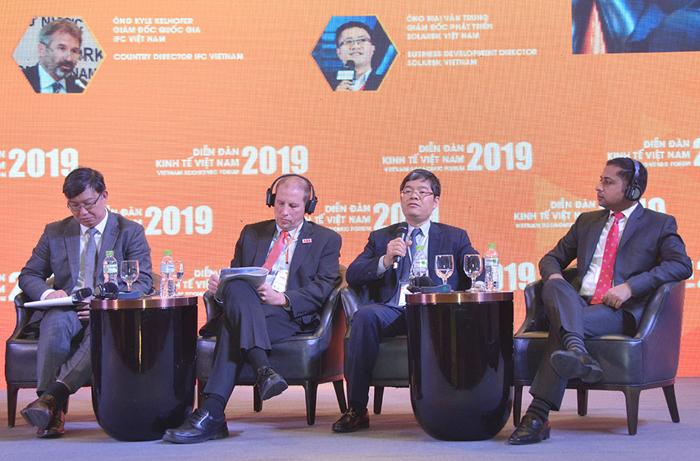The seminar was within the framework of Viet Nam Economic Forum 2019.

EVN’s Vice President Nguyen Tai Anh (2nd from right) shared at the Seminar
At the Seminar, Mr. Nguyen Tai Anh – EVN’s Vice President said: Vietnam Electricity (EVN) has been tasked by the Government to play a key role in ensuring energy security, supplying electricity for the national socio-economic development.
Every country has to go through three stages of energy development. In the first stage of less developed, the growth rate is very low (similar to Viet Nam before 1990). In the second phase, the rapidly growing GDP entails a correspondingly rapid growth of electricity (similar to Viet Nam today with power sales increasing by more than 10% per year). The final stage is a period of saturation and slow development. With such three stages of development, each country determines its most suitable energy development policy subject to its own natural conditions and primary energy sources.
“In 2018, Viet Nam produced over 200 billion kWh and will expectedly generate up to 570 billion kWh by 2030 in order to meet the economy’s requirements. In the meantime, primary energy sources in Viet Nam are exhausted. This is a huge challenge for Viet Nam's power industry”, said Mr. Nguyen Tai Anh.
Mr. Nguyen Tai Anh also introduced three objectives for energy development: Reliable operation of the power system to ensure energy security and safety; sustainable development associated with environmental protection; and electricity tariff must be affordable and suits the economy.
As for the development of renewable energy (RE), Mr. Nguyen Tai Anh added: Viet Nam has introduced many preferential policies and incentives to put renewable energy into practice. However, this energy source can just supplement rather than replace conventional energy sources.
In addition, the yearly wind power production time in Viet Nam is only about 2,000 hours, while this figure in Nordic countries is around 4,000 - 4,500 hours; the production time of solar power in Viet Nam is about 1,700 - 1,800 hours per year, while it is 3,500 - 4,000 hours per year in African and Middle East countries. Therefore, the renewable energy price in Viet Nam is not as cheap as other countries in the world. Although the feed-in tariff of solar power in Viet Nam currently is US cents 9.35, which is much higher than in European and American countries, many investors are carefully considering and deliberating their investments.
"The development of renewable energy is good and very necessary, but it should follow a roadmap to ensure energy security and power system safety," said Mr. Nguyen Tai Anh.
evn.com.vn
Share